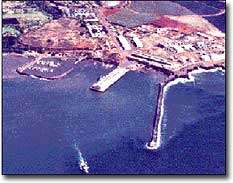A state Department of Health hazardous-waste expert called “major-major” alleged violations to state hazardous-waste laws by Chevron Hawai’i employees at the company’s Port Allen terminal near ‘Ele’ele.
State DOH representatives have filed a complaint and order alleging improper disposal of lead and lead-contaminated waste, and benzene, when evidence surfaced that Chevron workers disposed of these hazardous wastes in a trash bin, said Grace Simmons, supervisor of the DOH’s Hazardous Waste Section.
The contents of the trash bin eventually made their way to the Kekaha Landfill, said Simmons.
“We consider this a major-major (violation), major potential for harm, and major with respect for danger to the environment,” she said.
DOH representatives cited Chevron for improper maintenance and operation of the facility, and disposal of hazardous waste without a permit. The maximum fine for the infractions is $22,500.
Chevron’s legal department is reviewing the matter, and had no further comment on the order and citation, said Albert Chee, Chevron spokesman.
Simmons said Chevron company representatives have requested a hearing on the alleged violations, which is normally a prerequisite before negotiations take place should Chevron representatives decide to dispute DOH personnel’s findings.
Since the foam used to clean the tanks was generated in April of 2001, and the state inspection wasn’t done until September of last year, there is little hope that the state or company would be able to recover the hazardous wastes from the landfill, she said.
When cleaning out above-ground, fuel-storage tanks, company representatives are required to make a hazardous-waste determination before disposing of materials, she said.
“Our claim is that they were improperly disposed of,” she said of the hazardous wastes tossed into the trash bin.
State DOH representatives conducted a site inspection, checked the company’s written records, and asked questions about disposal methods used by employees during cleaning of the tanks near Port Allen Harbor.
The answers to the questions revealed that the hazardous wastes were disposed of in a trash bin, and that trash bin’s contents eventually made their way to the landfill, she explained.
In addition to paying the penalty, Chevron has been ordered to comply with state hazardous-waste and used-oil rules according to a schedule established by DOH representatives, Simmons said.
No date has been set for either a hearing or any negotiations between DOH and Chevron representatives, she concluded.
Staff Writer Paul C. Curtis can be reached at pcurtis@pulitzer.net or 245-3681 (ext. 224).





